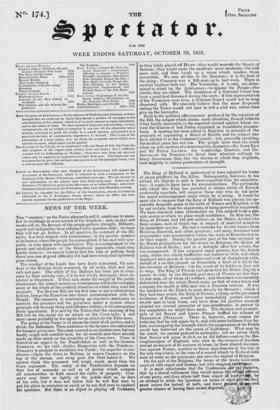NEWS OF THE WEEK.
THE "reaction;' as the Tories pleasantly call it, continues to mani- fest its workings in every corner of the kingdom ; and, as days and
weeks roll on, the fervour of the people gathers strength. Hitherto, regret and indignation have inflamed their speeches only; we hope they will not go farther. In all quarters, the conduct of the. Mi- nistry has been treated with forbearance • • in the greater number of instances, where the people have assembled, it has met with sym- pathy, in very many with approbation. This is a compliment to the power and intelligence of the Ministerial opponents, which they hardly deserve ; we cannot believe that the task of putting them down was one of great difficulty if it had been wisely andvigorously gone about.
The conduct of the Lords has been freely canvassed, the con- duct of the Bishops freely censured, by all ranks, high and low, rich and poor. The utility of the Bishops has been put in abey- ance by their unlucky vote; if it be not wholly destroyed ; their ex- istence is threatened. If they sink under the weight of the public displeasure, the alnioit necessary consequence will be the sweeping away of the whole of the political structure of which they were the supports. The Reform Bill, for the first time in our constitutional history, brings the Executive into direct communication with the People. The necessity of continuing an expensive machinery to connect the governor and the governed, under a system where principle will be every thing and influence nothing, is in consequence freely questioned. It is said by the Tories, that the carrying of the Bill will be the signal for an attack on the Corn-laws; it will much more probably be the signal for an attack on the Tithe-laws. The policy of the Tories is to alarm the timid of all parties, and to divide the Reformers. Theiraddresses to the farmers are calculated for farmers gross ears. They may succeed as an election ruse, but can hardly weigh with sensible men, for all sensible men have already made up their minds on the absurdity of the Corn-laws. There is therefore an appeal to the Fundholders as well as the farmers. COBBETT, we • are told, divides Hampshire with the Ministers ; COBBETT is pledged to annihilate the Funds ; the sequitur is con- clusive—Open the sluice to Reform, in comes COBBETT on the top of the stream, and away goes the Debt before it. We cannot think this argument will weigh much more than the Corn argument. The safety of the Fundholders depends on that law of necessity as well as of justice which compels all communities to hold sacred the rights of property. Con- BETT may think as lightly of the public debt as he does of his own, but it does not follow that he will find men to put his plans in execution as easily as he 'can find men to applaud his Speeches. 'But. thOe is an object in playing' off Comirr, as they lately played off HUNT—they would separate the friends of Reform—they would make the moderate more moderate, the wild more wild, and thus break up a union which renders them irresistible. We owe all this to the Ministers ; it is the fruit of the delay; COBBETT was a Bill-man up to last week. There is another bugbear held out. The Yeomanry, it is said, are deter- mined to stand by the Aristocracy—to oppose the People—the rabble, they are called. The formation of a National Guard has been a good deal discussed during the week : if this representation of the Yeomanry were true, a National Guard could not be long dispensed with. We sincerely believe that the more desperate among the Tories would not care to risk a civil war, rather than give up the boroughs. Next to the political effervescence produced by the rejection of the Bill, the subject which claims most attention, though hitherto it has hardly received it, is the expected visitant against whose ar- rival the Gazette of last Friday suggested so formidable prepara- tions. A meeting has been called in Brighton to consider of the propriety of appointing a Board of Health, and the subject has been alluded to in the Common Council ; but, generally speaking, the medical panic has not run. The people have been too much taken up with matters of a more exciting character—Sir JOHN KEY and Sit' PETER LAURIE, the Cambridge Election, and Mr. IRVING on the Tongues—to direct their attention willingly to heavy discussions, that, like the disease in which they originate, tend mightily to induce prostration of strength.






























